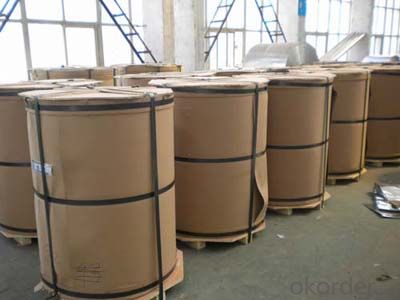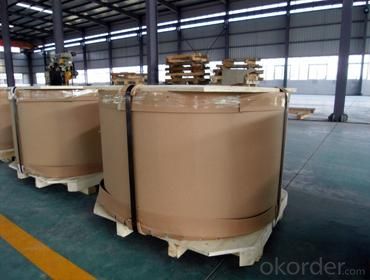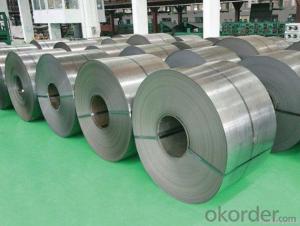Aluminium Coil For Curtain Wall Materials Production
- Loading Port:
- Shanghai
- Payment Terms:
- TT OR LC
- Min Order Qty:
- 2 m.t.
- Supply Capability:
- 60000 m.t./month
OKorder Service Pledge
OKorder Financial Service
You Might Also Like
Item specifice
Aluminium Coil For Curtain Wall Materials Production
Alloy | 1050, 1060,1100, 3003 3004 3105 3A21 5005 5052 etc |
Temper | O/H12/H14/H1/H18/H32/H34/H36/H38//H111/H112/H116/H321/T6/T651/T3/T351 etc |
Thickness | 0.1mm to 6mm |
Width | 20mm to 3300mm |
Coil weight | 100kgs to 6 tons depends on actual requirement |
Core material | Aluminum or paper |
Coil inner diameter | 75mm, 150mm, 200mm, 300mm, 405mm, 505mm or as required |
Appplication | construction, roofing, decoration, lamping etc |
Package | eye to wall or eye to the wall for aluminum coil with wood pallet (wooded case also available) |


3) Glass curtain wall frame
4) Interior decoration
5) Elevator decoration
6) Signs, nameplate, bags making.
7) Automobile parts material
8) Office and Household appliances: HVAC equipments
9) The consumer electronics: mobile phones, digital cameras, MP3 .etc.
Coating varieties
Polyester Coatings (PE)
PE (polyester) coatings exhibit an excellent combination of hardness, flexibility, flow, appearance, and superior resistance to dirt retention in indoor and outdoor applications. These coatings are highly resistant to abrasion, metal marking, staining, and marring, and require minimal maintenance. Glazetech uses polyester paints which provide excellent colour and gloss retention properties.
Polyvinylidene Fluoride Coatings (PVDF)
PVDF (polyvinylidene fluoride) is a chemical resistant thick film barrier coating commonly used in architectural applications where both excellent appearance and substrate protection must be maintained over a long period of time. This coating is unaffected by most chemicals and solvents and has excellent wear and abrasion resistance. PVDF also has a high dielectric strength, excellent resistance to weathering and the ability to self extinguish.
FAQ
--Q: Do you provide free samples?
--A: Yes, free samples will be sent to you on freight at destination.
--Q: Can I get your latest products catalogue?
--A: Yes, it will be sent to you in no time.
--Q: What is the MOQ?
--A: 2 tons
--Q: What are your payment terms?
--A: We accept L/C, T/T.
--Q: What kinds of alloy can you supply?
--A: 1000 series: 1050, 1060, 1070, 1100, 1145, 1200
3000 series: 3003, 3004, 3105, 3104
5000 series: 5052, 5083, 5754, 5182
6000 series: 6061, 6063, 6062, 6063
8000 series: 8011, 8021
--Q: What’s the coating of top side?
--A: PVDF and PE coating
--Q: What kinds of temper can you supply?
--A: O-H112: O,H12,H14,H16,H18,H22,H24,H26,H,32,H34,H111,H112
T3, T4, T6
- Q:Are aluminum coils prone to corrosion?
- Yes, aluminum coils are prone to corrosion. Aluminum is a reactive metal that tends to oxidize when exposed to oxygen and moisture, leading to the formation of a layer of corrosion on the surface of the coil. However, this can be mitigated by applying protective coatings or using alloys that are more resistant to corrosion.
- Q:What is the balanced equation for copper (I) oxide and Aluminum?
- Copper(I) oxide is a solid and so is aluminum. Any reaction that might occur would have to be at an elevated temperature. This is a thermite reaction in which copper(I) is reduced to copper metal (molten) and aluminum is oxidized to aluminum oxide. 3Cu2O(s) + 2Al(s) -- 6Cu(s) + Al2O3(s) ========= Follow up ========== Do you mean in aqueous solution? There won't be any copper(I) chloride in aqueous solution. CuCl is very insoluble in water, but will undergo disproportionation to form Cu2+ ions and copper metal. Therefore, you would actually have a solution of copper(II) chloride. Copper(II) chloride will react with aluminum to form copper metal and aluminum ions. Ordinarily aluminum won't react with copper(II) ions. The reaction does proceed in the presence of chloride ion. This is because the chloride ion will react with the Al2O3 layer on the surface of aluminum metal to make [AlCl4]^- which exposes the aluminum metal below, and thus a reaction can occur. 3Cu2+ + 2Al(s) -- 2Al3+ + 3Cu(s)
- Q:Can aluminum coils be used in the production of automotive heat shields?
- Yes, aluminum coils can be used in the production of automotive heat shields. Aluminum is a popular choice for heat shields due to its excellent thermal conductivity and heat resistance properties. The use of aluminum coils allows for the creation of lightweight and durable heat shields that effectively dissipate and reflect heat away from critical components in the automotive system. Additionally, aluminum coils can be easily formed and bent to fit specific shapes and designs, making them highly adaptable for various automotive applications.
- Q:How do aluminum coils contribute to the sound insulation of buildings?
- Aluminum coils contribute to the sound insulation of buildings by acting as a barrier or shield against sound transmission. The coils are often used in the construction of windows, doors, and other building components to dampen or block noise from entering or exiting a space. Their properties, such as their density and ability to reflect or absorb sound waves, help reduce the level of noise that can pass through the building envelope, resulting in improved sound insulation.
- Q:What is the typical thermal conductivity of aluminum coils?
- Aluminum coils typically exhibit a thermal conductivity ranging from 205 to 220 W/mK. Renowned for its exceptional thermal conductivity, aluminum stands as a favored option for heat transfer purposes, notably within HVAC systems, refrigeration units, and heat exchangers. The remarkable thermal conductivity of aluminum facilitates effective dissipation and transfer of heat, thereby guaranteeing peak performance and energy efficiency in said systems.
- Q:Can aluminum coils be used in explosive environments?
- It is not recommended to use aluminum coils in explosive environments due to their flammable nature. When exposed to specific conditions, aluminum can easily ignite and worsen fires. Explosive environments, which already possess an increased risk of fire and explosions due to the presence of gases, vapors, or dust particles, should strictly avoid the use of aluminum coils. This precaution is necessary to eliminate potential ignition sources and maintain safety in the surroundings. Instead, materials with superior heat and fire resistance should be employed in these hazardous settings.
- Q:How do aluminum coils contribute to the electrical conductivity of products?
- Due to its excellent conductivity properties, aluminum coils find widespread use in electrical applications. With its high electrical conductivity, aluminum serves as an ideal material for the transmission and distribution of electrical power. The utilization of aluminum coils in products promotes the smooth flow of electric current. Thanks to its low resistance to the flow of electricity, aluminum enables efficient transmission of electrical energy. This low resistance guarantees minimal power loss during transmission, an essential factor in maintaining the efficiency of electrical systems. Moreover, aluminum coils possess a high thermal conductivity, enabling them to rapidly disperse the heat generated during the transmission of electrical current. This ability is crucial in preventing overheating, ensuring the stability and longevity of electrical products. The lightweight nature of aluminum further enhances its suitability for electrical applications. Its low density makes it easier to handle and install, reducing the overall weight of products and enhancing their portability. In conclusion, aluminum coils play a significant role in improving the electrical conductivity of various products. Their high conductivity, low resistance, and exceptional thermal properties make them the preferred choice in a diverse range of electrical applications, including power transmission lines, electrical cables, motors, transformers, and other electrical devices.
- Q:How are aluminum coils annealed?
- Aluminum coils are typically annealed through a process known as heat treatment. This involves heating the coils to a specific temperature and then slowly cooling them down. The purpose of annealing is to soften the aluminum and improve its ductility, making it easier to work with. The first step in annealing aluminum coils is to clean them thoroughly to remove any contaminants. The coils are then placed in a furnace, which is heated to the desired temperature. The temperature and duration of the annealing process depend on the specific grade and thickness of the aluminum being treated. Once the coils reach the desired temperature, they are held at that temperature for a predetermined amount of time. This allows for the internal structure of the aluminum to become more uniform and relieves any internal stresses that may have developed during the manufacturing process. After the annealing process is complete, the coils are slowly cooled down in the furnace. This slow cooling is important to prevent the formation of any new internal stresses. Once the coils have cooled to room temperature, they are ready for further processing or use. In some cases, a process known as quenching may be used after annealing. Quenching involves rapidly cooling the aluminum by immersing it in a quenching medium, such as water or oil. This can help to further improve the mechanical properties of the aluminum, such as its strength and hardness. Overall, the annealing process for aluminum coils is a carefully controlled heat treatment that aims to improve the metal's properties and make it more suitable for various applications.
- Q:How do aluminum coils compare to fiberglass coils in terms of weight?
- Compared to fiberglass coils, aluminum coils are generally lighter in weight. Aluminum is renowned for its lightweight properties, making it an excellent choice for various applications, including coil manufacturing. On the contrary, fiberglass tends to be denser and heavier than aluminum. This disparity in weight offers several advantages when it comes to installation and transportation. The lighter aluminum coils are easier to handle, necessitate less effort for installation, and can be more cost-effective for shipping and logistics. Moreover, the reduced weight of aluminum coils contributes to overall energy efficiency in HVAC systems, as it requires less power to circulate air through the coils. Nevertheless, it is important to note that the weight comparison between aluminum and fiberglass coils may vary based on the specific design and thickness of the materials utilized.
- Q:Can aluminum coils be used in the production of aluminum sunshades?
- Yes, aluminum coils can be used in the production of aluminum sunshades.
1. Manufacturer Overview |
|
|---|---|
| Location | |
| Year Established | |
| Annual Output Value | |
| Main Markets | |
| Company Certifications | |
2. Manufacturer Certificates |
|
|---|---|
| a) Certification Name | |
| Range | |
| Reference | |
| Validity Period | |
3. Manufacturer Capability |
|
|---|---|
| a)Trade Capacity | |
| Nearest Port | |
| Export Percentage | |
| No.of Employees in Trade Department | |
| Language Spoken: | |
| b)Factory Information | |
| Factory Size: | |
| No. of Production Lines | |
| Contract Manufacturing | |
| Product Price Range | |
Send your message to us
Aluminium Coil For Curtain Wall Materials Production
- Loading Port:
- Shanghai
- Payment Terms:
- TT OR LC
- Min Order Qty:
- 2 m.t.
- Supply Capability:
- 60000 m.t./month
OKorder Service Pledge
OKorder Financial Service
Similar products
New products
Hot products
Related keywords





























